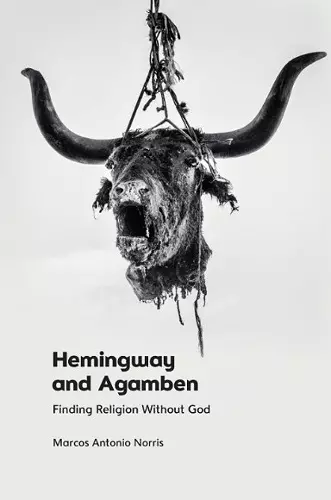Hemingway and Agamben
Finding Religion without God
Format:Hardback
Publisher:Edinburgh University Press
Published:31st Oct '23
Currently unavailable, and unfortunately no date known when it will be back

Interprets Hemingway's fiction through the philosophical lens of Giorgio Agamben Resolves debate over Hemingway's religious orientation Brings Hemingway, Jean-Paul Sartre, and Giorgio Agamben into close conversation for an interdisciplinary study of political theology, existentialism, posthumanism, and modernist literature Leverages Giorgio Agamben's analysis of secularization for an unprecedented reading of Hemingway's fiction Reveals the Roman Catholic foundations of secular existentialism, as well as the existential underbelly of literary modernism Presents the ritualistic killing of animals by human beings as the latter's semi-conscious attempt to reclaim the imago Dei Builds upon the preceding points to level a posthumanist critique of moral absolutism Marcos Antonio Norris implements Giorgio Agamben's notion of 'secularized theism' to resolve a critical disagreement among Hemingway scholars who have portrayed the writer as either a Roman Catholic or a secular existentialist. He argues that Hemingway is, properly speaking, neither a secularist nor a theist, but a 'secularised theist', whose 'religion' is practiced through sovereign decision making, which, in its most extreme form, includes the act of killing. This book resolves an important debate in Hemingway studies and uncovers fundamental similarities between theism and atheism, building upon the theoretical undertaking first introduced by Agamben and the Existentialists (EUP, 2021). Bringing Ernest Hemingway, Jean-Paul Sartre and Giorgio Agamben into close conversation, the author reconceptualises existentialism, issues a posthumanist critique of moral authoritarianism and advances an original interpretation of Hemingway as a secularised theist.
ISBN: 9781399516785
Dimensions: unknown
Weight: unknown
280 pages